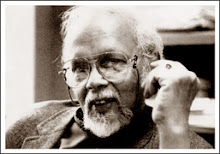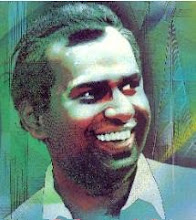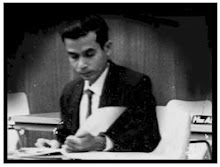|
DRAMA: Recently concluded 36th Annual National Drama Festival reflected the dramatic presentations of the cream of present-day dramatists of the country. The festival was dominated mostly by the young play-wrights who are still fresh to the medium, and are at various stages of learning and experimentation.
Of the 13 plays that came on stage at the festival competing for national honours, only four were translations or adaptations. There were nine original plays which is a welcome departure from the trend that was at the beginning of the century when majority of the plays at the festival were translations signifying the dearth of original creative talent at national level.
The Sri Lankan theatre audience should certainly be exposed to world theatre which has the capacity to enhance their taste and knowledge; but, not at the expense of original plays springing from our own soil spraying a fresh scent and a taste.
Research into our socio-cultural and political interaction prevailing in the social millieu throwing up various issues, should be the subject for indepth study and dramatisation within the local theatre arena.
They should be able to interpret their vision back to the general audience. Anyway, the objectives of the previous drama panels to reward the original scripts with awards appears to have been productive and paying in the long run.
At the drama festival there was Kuweni as a new production of the magnificent original play written by Henry Jayasena, which had a significant viewership appeal in the sixties.
|
Also, it was the best play in 1963. The new production was by a young dramatist Samudra Karunananda from the University of Aesthetic Studies.
Although she failed to generate the tremendous poetic and dramatic quality in the original play, it was a good attempt by a young drama artist whose intention was to revive the image of universal woman who is destined to suffer continuously in her effort to seek freedom from endless suffering to which she was born.
Comedy
The festival opened with Kasimalla of Nalaka Withanage. It was a comedy based on a social theme centering round man's craze and greed for money. It was moving briskly arousing laughter and curiocity thereby compelling the audience to a teat of joy.
Janathawa Paradai of Anura Ekanayake is a political play focusing on the prevailing corrupt political system. However, dramatically it failed to make an impact on the viewers as it depended more on throwing about bunches of verbal punches.
Buddhika Damayantha who is one of our leading young dramatists presented his first ever original play Putha Enakam.
It tells about the urban domestic life which has miserably failed to realize its true aspirations which go counter to each other and no common goal of realization could be achieved. However, the script is not strong enough to give dramatic effect and create spectator interest in the play however powerful and relevant the theme was.
Cultural values
Man Diyawela (I am dissolved) which won the awards for the Best Play, Best Direction and Best Original Script was a superb production directed by young playwright Thanuja Wanniarachchi. It was a dynamic, neat and coherent production reflecting various social, academic and emotional issues the present-day youth have to face, and how finally their fertile ambitions fail and crumble disintegrating their hopes for a prosperous future.
Sunil Chandrasiri, a veteran dramatist in the current Sri Lankan theatre, brought Maya Devi on stage for the festival. It portrays the ill-effects of the open economy introduced in 1977.
Consequently the cultural and social values were steadily losing their hold and influence on the individual and society as a whole. The use of divine characters to strike his theme on an unusual note is the principle feature of the script written by K. B. Herath. However, it failed to produce the degree of depth it envisaged.
Mekka (The Flea) was directed by M. S. Weerasooriya. It depicts the surrender of one's reasonable thinking to meaningless childish and superficial feelings which finally ends with ruining one's own future.
Vijaya Nandasiri the popular film and teledrama actor and veteran theatre personality brought Sri Gajaba on stage. It was based on the life of King Gajaba who reigned in the 2nd century AD.
He was well-known for walking down the streets in his kingdom disguised as an ordinary man in order to gather first-hand information about the life of the citizens.
However, it failed at the script level as well as the production level to create an impact on the audience.
Bertolt Brecht's Mother courage and her Children translated into Sinhala as Diriya Mava Saha Ege Daruwo by Henry Jayasena was able to create an impression among the audience with a fine performance by the artists.
Significantly, it highlighted the cruelty in war, a current subject very close to any Sri Lankan today. Anoja Weerasinghe the veteran award winning film actress won the award for the best actress at the festival for her role as Diriya Mawa. For her to have shared this honour with another actress was looked down upon as a flaw in judgement and indecisiveness as there could be only one 'best' actress.
Difficult play
Together with this classic their was another world renowned play. Henric Ibsen's Dolls House is A tale centred around sharing life at home between husband and wife, which finally turned sour due to misunderstanding and lack of understanding as a result of failure to be appreciative of each other's role at home. It was titled Boniki gedara in Sinhala.
Yet another translation Vana Tharavi was adopted to stage by E.M.D. Upali a well-known figure in our theatre. Its original Henric Ibsen's The Wild Duck is considered his most pleasant as well as the most difficult play. Malkanthi Jayasinghe performing the role of Jina in this play, won the award for the best supporting actress of the year.
Sanda Gini Aran an original play written and directed by Thumindu Donatenna is a well conceived plot although it failed at the performance to win an award. The script interspersed with quotations from Sinhala literature may have been a distraction to rob its originality which could have been viewed from a different perspective.
Anyway, the play was developed within a troubled rural background and was made to move along a story of love and romance the strongest human sentiment that could go totally wild or leave one totally cold.
Translated by award winning national poet Ariyawamsa Ranaweera Denuwara Dennek was an excellent comedy directed by Susil Gunaratne. Its original play was in Russian written by Emil Braginsky and Eldar Ryazanov. It is one of the world famous comedies.
At a time when there are less comedies, it is heartening to see two comedies coming on stage this year. Madani Malwattage as Nadhya succeeded in sharing the award for the best actress with Anoja Weerasinghe who said that she would have been happier had it been awarded to Madani instead of making them to share it.
A hilarious comedy well directed with perfect timing and brisk movements is based on a mistaken identity of an apartment. The audience enjoyed it from start to finish.
Distant dream
Sri Lankan theatre in general is gradually shrinking with less and less dramatists both young and old producing plays. The audience at any theatre is dwindling and the golden era of Sinhala theatre in the sixties and seventies is today a distant dream with no sight in the near future.
This year, of the 37 scripts submitted to the National Drama Panel 23 were presented in the initial round of selection. At the end, 13 plays came on stage representing the final round at which a panel of independent judges selected the awardees.
However, enthusiasm of the few playwrights together with a few young dramatists who aspire to become dramatists in future, constitute the present group in theatre contributing their maximum with minimum agitation to keep the mother of all arts alive and breathing.
In this national endeavour, the National Drama Panel headed by Tilak Jayaratne performs a tremendous job by initiating, organizing, evaluating and warding both Sinhala and Tamil Stage plays.
If the panel initiates a programme to make an effort to take national award winning plays to the people embracing a wider spectrum of viewers, we can expect a growing audience for theatre in the near future.
Once theatre was the foremost medium of entertainment too, before the advent of first the wide screen, and then the small screen, taken in intellectual and appreciative grip of general viewership.






































No comments:
Post a Comment